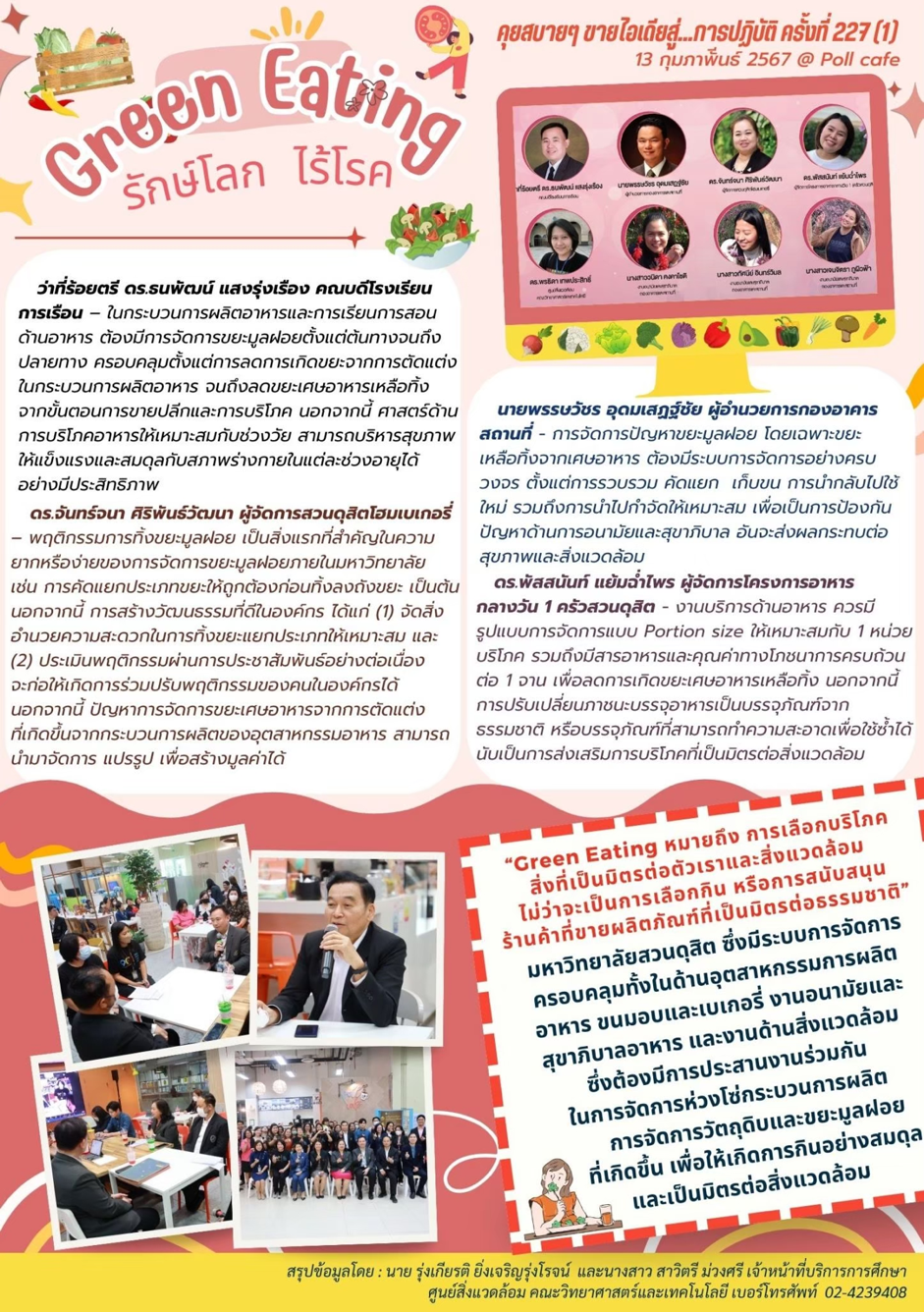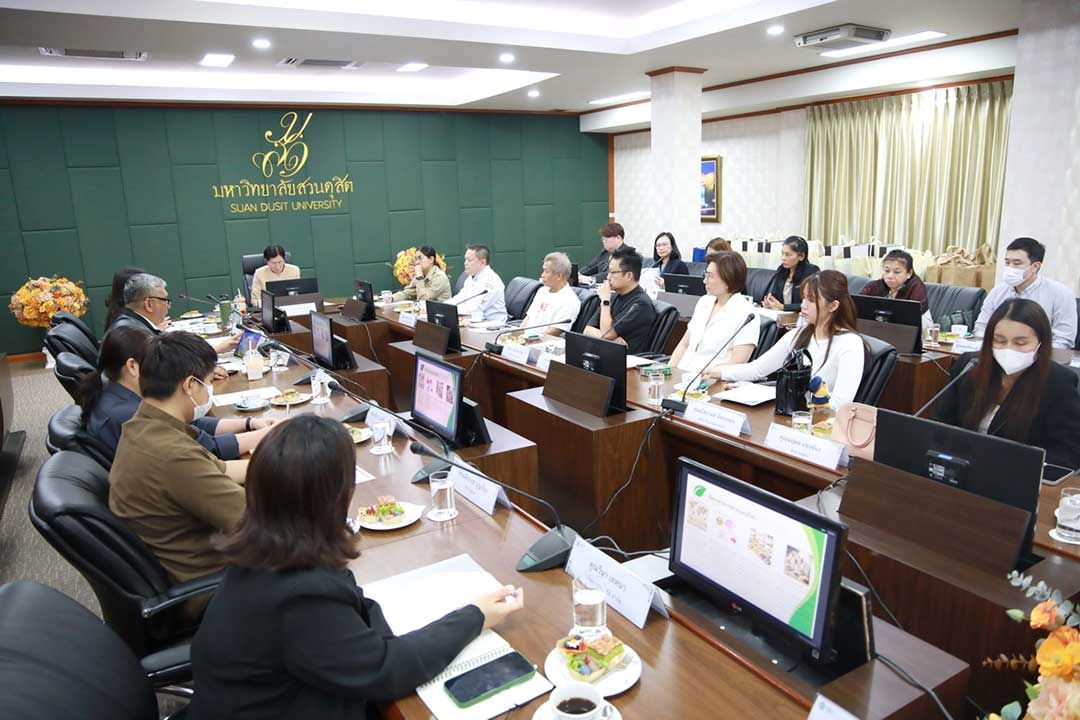Suan Dusit University has continuously implemented its mission in resource management and sustainability under the concept of “University for Sustainable Society,” with a focus on driving the United Nations Sustainable Development Goals (SDG 2: Zero Hunger) through the integration of academic knowledge with systematic food waste management, continuous monitoring and evaluation, and the cultivation of sustainability consciousness, to achieve tangible improvements in quality of life and environmental conditions.
During the academic years 2023-2024, Suan Dusit University developed a multidimensional food waste management system encompassing monitoring and evaluation, transparent data reporting, behavioral development among personnel and students, and extension to the business sector and communities. Each activity reflects the university’s role as a “Learning Center for Food Sustainability” that connects knowledge with practical implementation in the field.
The first initiative is the development of the “Food Waste System Document” under the SDU Zero Waste project to establish standardized guidelines for food waste management across the university. Section “3.4 Data Collection, Monitoring, and Control of Food Waste Management” stipulates that staff members and cleaning personnel in each area must weigh food waste daily and maintain systematic records. Subsequently, data are transmitted to supervisors for consolidation and analysis at the university level. This document exemplifies the creation of a standardized monitoring system that comprehensively covers the entire organization, enabling the university to plan and improve food waste management with optimal efficiency.
The second initiative is the preparation of the “Annual Report on Food Waste Management at Suan Dusit University for the Year 2023” which is disseminated through the SDG Drive website to ensure accessibility for staff members, students, and the general public in a transparent manner. This public disclosure of information demonstrates accountability and readiness for scrutiny, while establishing confidence among all stakeholders that the university implements food waste management seriously and continuously. Additional details are published through the university’s official website.
View Report Details
The third initiative is the “Sustainable Eating for Health, Food Waste Reduction, and Carbon Footprint Reduction” project, organized to promote behavioral changes in food consumption among personnel and students through education about the impacts of food waste and practical approaches to waste reduction. This activity includes data collection from sample groups to study consumption behaviors and behavioral modifications, with the objective of building consciousness and food waste management skills among members of the university community. This activity received collaboration from internal university units and attracted widespread participation.

View Project Details https://sdg.dusit.ac.th/2025/7137/
The fourth initiative is the “Development of Surplus Food Management Mechanisms in the Bakery Business” project, organized by Suan Dusit University in collaboration with the Agricultural Research Development Agency (Public Organization) or ARDA, to extend knowledge regarding surplus food and food waste management to the business sector and communities. This initiative is supported by research on “Management Approaches for Surplus Food from the Bakery Business” and food waste management at the Sandbox at Suan Dusit Home Bakery, with consultative meetings organized for entrepreneurs and relevant stakeholders. This activity aligns with both SDG 2 (Zero Hunger and Promotion of Sustainable Agriculture) and SDG 12 (Responsible Consumption and Production).

View Project Details https://www.naewna.com/relation/868801
These initiatives collectively reflect Suan Dusit University’s commitment to driving sustainability missions comprehensively at the organizational, community, and policy levels. The outcomes include the development of standardized food waste monitoring and evaluation systems, strengthening of collaborative networks among the university, government agencies, and the business sector, and the cultivation of a new generation of sustainability leaders from among the university’s student and staff populations who can extend their knowledge to their respective areas.
Furthermore, Suan Dusit University disseminates information on food waste management performance through its official website (https://www.dusit.ac.th) and the Sustainable Development Goals Center website (https://sdg.dusit.ac.th) to enable public access to evidence of operations in a transparent manner and to serve as a model for developing sustainability activities at other educational institutions. The aforementioned operations align comprehensively with all components of the 2.2.1 Campus Food Waste Tracking indicator of THE Impact Rankings, including the existence of measurement systems, provision of evidence of operations, and public dissemination of information.
In conclusion, food waste management at Suan Dusit University demonstrates the integration of knowledge, professional expertise, and multi-stakeholder participation in creating sustainability through diverse mechanisms, ranging from monitoring and evaluation, transparent data reporting, and behavioral development to external extension. All of these reinforce the role of Suan Dusit University as an “Exemplary Educational Institution in Sustainable Resource Management” that aims to create positive impacts on society and the environment through knowledge and sustainable collaboration.
Follow information and SDG performance of Suan Dusit University a
– Suan Dusit University Website: https://www.dusit.ac.th
– Sustainable Development Goals Center: https://sdg.dusit.ac.th
– SDU Zero Waste Project: https://sduzerowaste.dusit.ac.th
Suan Dusit University has continuously implemented sustainability initiatives under the “University for Sustainable Society” concept, focusing on SDG 2: Zero Hunger through systematic food waste management, monitoring, and consciousness-building.
During 2024, the university developed a comprehensive food waste management system encompassing four key initiatives. First, the Food Waste System Document under the SDU Zero Waste project established standardized guidelines requiring daily weighing and recording of food waste across all campus areas, with data consolidated at the university level for analysis and planning. Second, the Annual Report on Food Waste Management for 2023 was published on the SDG Drive website, demonstrating transparency and accountability to all stakeholders. Third, the “Sustainable Eating for Health, Food Waste Reduction, and Carbon Footprint Reduction” project promoted behavioral change through education and data collection on consumption patterns. Fourth, collaboration with the Agricultural Research Development Agency (ARDA) extended food waste management knowledge to the bakery business sector.
These initiatives align with THE Impact Rankings indicator 2.2.1 Campus Food Waste Tracking, encompassing measurement systems, evidence provision, and public disclosure. The outcomes include standardized monitoring systems, strengthened collaborative networks, and cultivation of sustainability leaders. All information is publicly accessible through official university websites, serving as a model for other institutions and reinforcing Suan Dusit University’s role as an exemplary institution in sustainable resource management.
